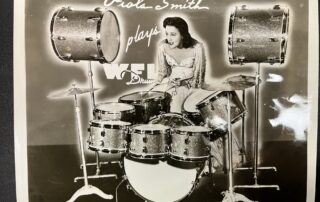Born into African culture, your name, your family and your sense of place are highly valued. For Osonye “Tess” Onwueme, the name “Osonye” means, “If you like me, accept me the way I am. If not, leave me alone.” And she’ll tell you that with her broad smile and ever present happy laugh.
It’s part of her African identity that she brought with her when she arrived in the United States. Onwueme was granted the opportunity by winning the International Literary Award in 1989 and along with it a teaching academic fellowship. For the past 23 years she has live in Eau Claire. Specifically for Onwueme, UW-Eau Claire created the position of Distinguished Professor for Cultural Diversity. Since 2010, she has held the special title as University Professor of Global Letters, and Professor of English in recognition of her growing influence as a playwright. This named position is held be only a few eminent writers in the U.S.
When Onwueme arrived at UW Eau Claire she brought with her clout as a prominent African playwright. “My work, my plays, my writing take me all around the world, and so in a way I’m like a culture ambassador, for UW-Eau Claire and for the UW System and for Wisconsin and for America.”
She teaches a course on Women in African Literature and begins her presentation with the African Ebu greeting, “Kwenue.” Her students return the greeting. On this particular night, she offers a glimpse into her work called, “The Reign of Wazobia.” It is an Onwueme original play about women in Africa. The main character, Wazobia, begins to question why women are held back, while men are privileged to do as they please. Wazobia defiantly organizes and mobilizes the women to rebel against the men.
This African playwright’s compositions come from the heart, and the heartache of a personal narrative that fuels her writing. She tells the true story of how her mother ran away when Onwueme was just six years old. She was fleeing from an abusive, failed marriage. “I know what poverty is, and I also know what it is to experience abuse, and violence and oppression and suppression. I have lived these experiences. Maybe that’s why I’m much more passionate and I have a keen eye for justice and for equity.”
In colonial Nigeria, she was one of a few from her village to attend a Catholic boarding school taught by Irish nuns. With high school behind her, it was off to college at the University of Ife in Nigeria. This is where she would first meet an influential professor. Wole Soyinka was the first black person to win the Nobel Prize for Literature. He inspired her and Onwueme remembers the day she began to feel the voices of her characters. She said, “It was like a new door was opened. I had written a play and I was really happy, so happy, overjoyed from then on, I started writing plays.”
Dr. Osonye Tess Onwueme’s name is now etched alongside other contemporary African writers she is proud to call her friends. She will tell you she is in a very privileged league with the older generation of women writers like Maya Angelou, Alice Childress, and Sonja Sanchez.
In 2016, in an email Onwueme learned she had been nominated for the Nobel Prize in Literature. The most prestigious literary award in the world. “I felt very humbled, I felt elated and a heavy weight of responsibility as well,” Onwueme remembers. In the end, she did not win but another famous writer did. Bob Dylan who is also an idol for Onwueme. She remembers in high school back in Nigeria listening to music from the West. She admits she loved his music. When she found out he had won, she said, “To God be the glory. I’m happy.”
A collection of Onwueme’s lifeworks are now housed in the UW-Eau Claire archives. In recognition of her accomplishments, the State of Wisconsin passed a proclamation in her honor. Even with all the high praise, Onwueme will tell you, “I remain me: simple, rootsy, (laughs) rootsy, striding and walking tall in my African identity anywhere I go.
And she’s not done yet. She’s working on a play called “The Devil and his Christian Wife.” She can’t help but tell you the title with a smile and that indelible, infectious laugh.










